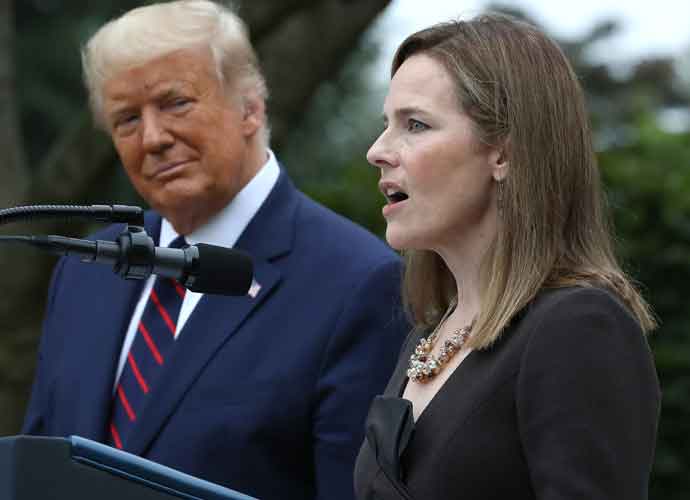

WASHINGTON, DC - SEPTEMBER 26: Seventh U.S. Circuit Court Judge Amy Coney Barrett speaks after U.S. President Donald Trump announced that she will be his nominee to the Supreme Court in the Rose Garden at the White House September 26, 2020 in Washington, DC. With 38 days until the election, Trump tapped Barrett to be his third Supreme Court nominee in just four years and to replace the late Associate Justice Ruth Bader Ginsburg, who will be buried at Arlington National Cemetery on Tuesday. (Image: Getty)
The White House is not contact tracing after a White House Rose Garden reception for Supreme Court nominee Amy Coney Barrett, where at least eleven people, and President Donald Trump himself, may have contracted COVID-19.
“The data speak for themselves. We had a superspreader event in the White House, and it was in a situation where people were crowded together and were not wearing masks,” the top infectious diseases expert Anthony Fauci told CBS.
The Trump administration had cut the Centers for Disease Control and Prevention out of the process and has made limited efforts to notify people who came in close contact with Trump in the two days prior to his coronavirus diagnosis.
The event, which was partially indoors, violated numerous COVID-19 guidelines, as most guests failed to wear masks or social distance.
Subscribe to our free weekly newsletter!
A week of political news in your in-box.
We find the news you need to know, so you don't have to.
White House spokesman Judd Deere said that there is a “robust contact tracing program” in place, “led by the White House Medical Unit with CDC integration.”
The New York Times reported that the “integration” refers to a CDC epidemiologist who has been working with the White House Medical Unit, led by Dr. Sean Conley. The White House did not name the scientist.
The White House has sent emails to certain people who came in close proximity to Trump within the two days before his COVID-19 diagnosis, but the emails were more so notifications of exposure, rather than efforts to track where the virus may have since spread.
Former Food and Drug Administration commissioner, Dr. Scott Gottlieb, told CBS on Sunday that he had spoken to several Rose Garden attendees but none had been contacted by anyone.
“I think they have an obligation to understand how the infection was introduced into that environment,” he said. “There doesn’t seem to be a very concerted effort underway.”
The Rose Garden event relied on rapid COVID-19 tests, which are often ineffective in detecting early cases of the virus, to screen guests. If they tested negative, guests could remove their masks.
Several officials who attended the event, including Vice President Mike Pence, have continued to attend social gatherings, citing negative test results. However, the CDC states that it can take up to 14 days after exposure (until anytime today) for the test to detect infection, and that assumes he has not been contracted the virus in the days since from other currently “undetectable” Rose Garden attendees.
Who tested positive for COVID-19 since attending the Rose Garden event?
Conservative media personality Candace Owens said she is “embarrassed” that she supported President Donald Trump…
One of Rep. Jerry Nadler's (D-New York) aides was detained by Department of Homeland Security…
The feud between Fox News’ Mark Levin and media personality Tucker Carlson escalated this week,…
NATO Secretary General Mark Rutte referred to President Donald Trump as “daddy” in a press…
After President Donald Trump signed an executive order in January limiting gender to a male-female…
Only two Democrats attended a congressional hearing about former President Joe Biden's alleged mental decline…